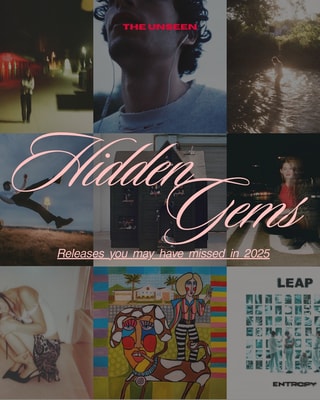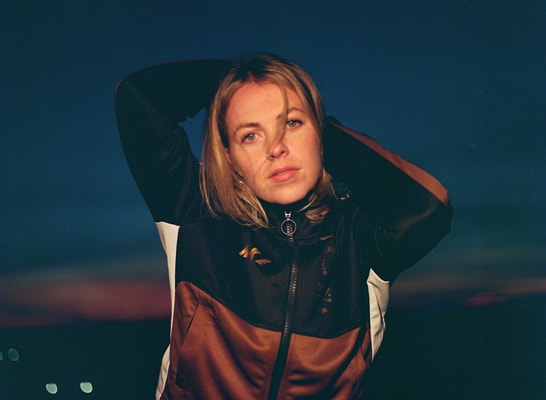"Our Strength Is in Solidarity" - KAFVKA's Uncompromising Voice Against The Right & For the Future
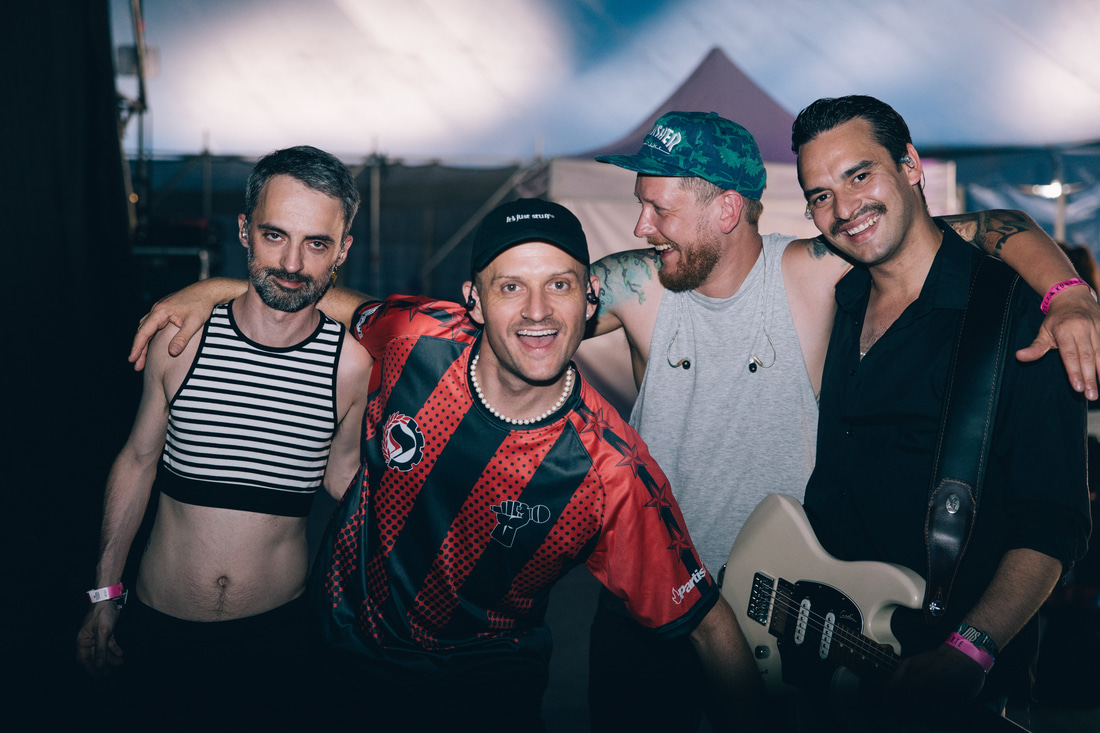
KAFVKA is a Berlin-based band mixing punk, rap, hip-hop, and rock with powerful, political messages. Their song Alle hassen Nazis, released in 2018, is to this day an anthem for people fighting against the far-right. Songs like Wie aus Stein, Wie lange noch bis, and So viel mehr also discuss important topics such as mental health, social injustice, and pressures.
On a sunny Friday afternoon in a small park in Wedding, Berlin, Laura from The Unseen Mag had the opportunity to sit down with front-singer Jonas from KAFVKA. After some chit-chat and Jonas finishing off his delicious-looking halloumi wrap, we settled onto a park bench to dive into the interview.
Laura: Hi Jonas, thank you for taking the time to interview with The Unseen Mag. How are you doing?
Jonas: My pleasure. I’m doing alright, it kind of depends on the day, but yeah, I was just thinking about something. I had just gone out to buy some halloumi from this store I’ve been going to now and have been for the past ten years. The owner is really lovely, and I know he has a Palestinian family background, so I was like: Okay, what’s going to happen now with the little small talk moment we always have? Because what’s happening in Gaza is getting more and more horrific, and of course, that weighs on me. For someone who actually has family there, it’s obviously on a completely different level. This time we didn’t have any small talk. It was just…different. But in a way, that was kind of a relief for me at that moment because I’m already dealing with my own emotions around it on a daily basis. I also have some friends over there, not in Gaza, but in the West Bank, and I’ve been there myself, too. So, I do have a connection, but honestly, I wouldn’t have known how to talk to him about it the right way. It all happened really fast. He didn’t ask much, and I just asked how his family is doing, and that was it.
Laura: It is always complicated to talk about these topics.
Jonas: Yeah, it is. But yes, day-to-day, I’m doing alright. The world’s a mess; sometimes you can block it out, and sometimes you can’t. Right now, I’m just excited to be doing an interview with this cool mag and with you. So, I’m all good.
Laura: Thanks again for taking the time! We’ll come back to topics like how messed up the world is, politics, and so on later. But first, for The Unseen Mag readers who might not know you or the band yet, I’ve prepared some rapid-fire questions. Please try to answer them in just a few words.
Jonas: Oh, I’m really bad at that. But I’ll try! *laughs*
Laura: You got this! How would you describe KAFVKA in three words?
Jonas: Ehrlich (Honest). Rau (Rough). Lieb (Kind).
Laura: What’s your favorite song to perform live?
Jonas: Definitely our all-time favorite, our hit "Alle hassen Nazis" (Everyone Hates Nazis). The crowd always goes wild for that one. But right now, I really love "Wie lange noch bis" from our last album.
Laura: That sounds amazing! What’s your favorite food or dish on tour?
Jonas: Pretty much anything from big festivals. They usually have amazing catering. Smaller shows often have home-cooked meals, which can also be really lovely. I don’t have one specific favorite dish, though.
Laura: Do you have a personal motto?
Jonas: “Mittelschwer depressiv, leicht zu begeistern“ (Mildly depressed, but easily excited). It’s from a solo track I’ve done.
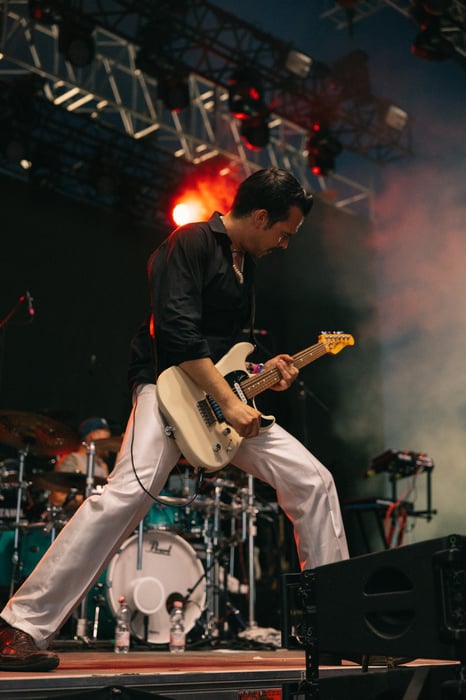
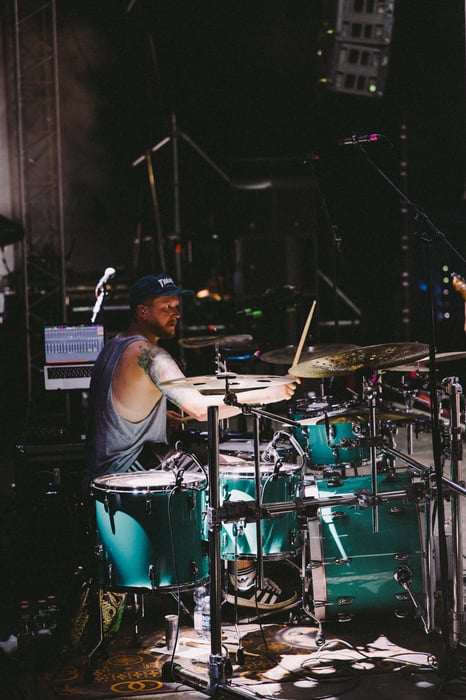
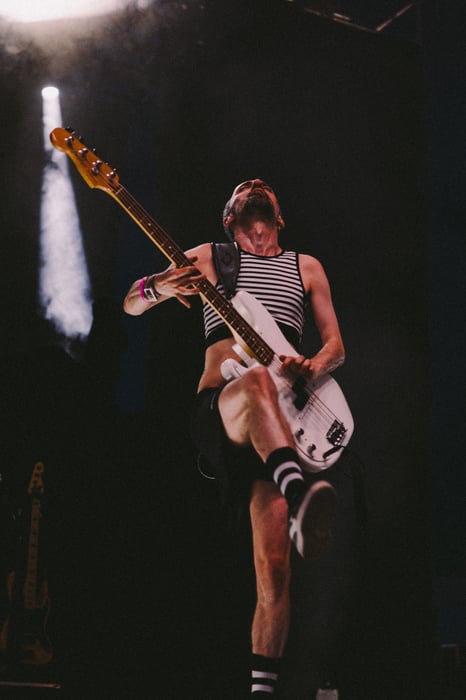
KAFVKAS ROOTS, INFLUENCES, AND RESPONSIBILITIES
Laura: Let’s go back to the beginning of KAFVKA. You started in 2013. Was that driven by political motives, or was there a specific message you wanted to convey?
Jonas: Honestly, neither. We just really wanted to make this kind of music. Of course, our sound has evolved over the 10 years we’ve been around, but it was never our plan to be a political band or get big or play massive festivals. I mean, sure, that’s the dream for most musicians. But we just wanted to make music. The political side came later, kind of naturally, through our own political development, I think.
Laura: Was there a defining moment that sparked this development?
Jonas: In 2014, I co-founded an NGO, a non-governmental organization, that helped refugees in Germany find housing. We connected them with shared flats, for example. That was the first time I actually met people who had fled to Germany. It gave me a whole new level of empathy. Also, my friend group became much more diverse. People of color, people from less privileged backgrounds. All of that was part of a long, ongoing politicization process that is still not over, but that’s how it started. Since I write lyrics for the band, all that stuff naturally made its way into our songs.
Laura: Was there a role model or inspiration? I’m asking because of your band name. I mean, it’s KAFVKA, but it's spelled a bit differently.
Jonas: Not Franz Kafka. More like Rage Against the Machine. We all listen to really different music in the band, but Rage Against the Machine is what we can all agree on. And also, Bilderbuch laughs. But yeah, Rage Against the Machine probably fits our music and our message the best. As for the name KAFVKA, we just wanted something short and memorable. That’s always the backstory that is kind of made up, a mix of Franz Kafka the writer and Markus Kavka, a DJ, who used to host a news show on MTV in the '90s. So, adding pop culture as well. Also, we had to spell it differently so we’d show up on Google. That was the real reason. *laughs*
Laura: You tackle topics like far-right extremism, racism, social division, and many more. Do you feel a responsibility because you and your band are making political art? Do you see yourself more as an artist or part of a movement? Or do you think you have no responsibility?
Jonas: No, I do feel like we have a responsibility now. We’ve built up a decent reach. I see myself mainly as a musician and lyricist, I think, but what we’re doing isn’t activism, per se, but it is a kind of political education. Like, I co-founded that NGO I mentioned, and in 2018, I helped start the Seebrücke movement. It’s about Germany fighting against the criminalization of sea rescue missions in the Mediterranean. It got pretty big, even in Austria, for example. But the issue’s kind of faded from media focus now, since people dying by the fortress Europe is overshadowed by other media coverage. I would say that was activism. But over time, I realized the band is where I have the most impact. More people hear me, and I can be more effective and reach them directly. And our reach also grew, so it enabled me to stop my project work and focus on music. And now, I hope that what we’re doing is a form of political education.
Laura: In your latest album Kaputt (2024), songs like Millionen, So viel mehr, Kaputt, and Wie aus Stein address a lot of different essential topics. Do you start with a message and then write the song? Or is it the other way around?
Jonas: It depends. We usually write the music together. Sometimes someone writes at home and presents it to the others, and then we continue working on it. Sometimes, we jam together in our rehearsal room and create musical structures. In both cases, I have my phone with about 900 notes with either full lyrics, phrases, or even just two words. Often when we’re playing something in our rehearsal room, the others play something, and I scroll through my notes to find something that matches the vibe, also rhythm-wise. Sometimes it clicks, sometimes it doesn’t. Sometimes I write something different at home. If I get the feeling that something clicks, so a draft or only an idea, fits the emotions of the song, I can keep writing easily. I always write down ideas, and that’s why I have so many different ones. That’s how it goes most of the time.
Laura: Like your story earlier with the halloumi and the shop owner?
Jonas: Exactly. Real everyday stuff. Just the other day, I rode my bike through Wedding. Here at Leopoldplatz is a place with a lot of people with addictions who also consume drugs. I rode my bike there, and a guy smoked so close to the biker trail that I drove through a cloud of crack smoke. I held my breath and was like: I don’t want to consume something like this. I’ve got nothing against the people there. I don’t want them to be driven away or something, but it was right in my face. Yesterday, I built up a song on this experience for a different project with a friend who also produces music. So like you said, everyday stuff. “Fahre mit dem Fahrrad durch eine Wolke Crack” (Driving with the bike through a cloud of crack) was the only thing I had written down, and then in the studio, I continued writing on it.
Laura: So your songs come together pretty fast?
Jonas: Nah, it usually takes ages. *laughs* Yesterday was different; that was my solo project – just one person and me. It’s like, boom: One song in one session. The band stuff takes longer, as there are four people involved, and it is different. We have to coordinate and get everyone in the rehearsal room. It’s not here in Wedding, but in Lichtenberg. It’s way more effort to find a date when we all have the time. It’s more effort, but the outcome is also more powerful.
Laura: I always think it’s so much more powerful to have this collective energy. Also, blending so many influences to be able to build something amazing out of it.
Jonas: Exactly, the four of us each bring in something different, and that’s what shapes our songs.
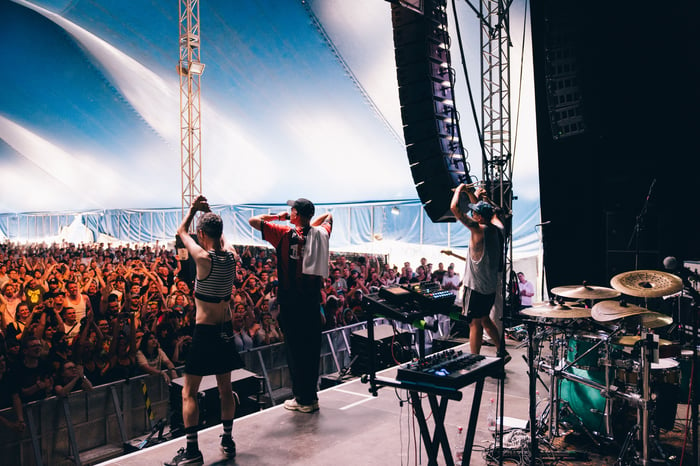
SOCIAL PRESSURE AND MENTAL HEALTH
Laura: I noticed, in songs like “So viel mehr,” you use “you” up until the final chorus, where you switch to “I”. Do you use this as a reminder to yourself, in this case, to not succumb to social pressures and self-doubt?
Jonas: *laughs* I love when people notice things in my lyrics that I might have not seen or thought of that way. It’s so interesting. Yes, it’s oftentimes I aim appeals or slogans in our songs at us or at myself, too. Sometimes I use “you” in the verses and “I” later to say: Hey, I’m part of this too. I’m not preaching from above and saying something like “Heyy, I'll tell you this and I’ll do it better anyway”. I need to hear some things as much as anyone else.
Laura: Personally, I have to say that I think the authenticity really comes through. KAFVKA never sounds distant or out of touch.
Jonas: That’s all a lie. *laughs* No seriously, thanks. That’s very nice feedback.
Laura: You already teased it within your motto. In “Wie aus Stein”, you talk about depression. Why do mental health themes come up in your work, and what does it mean to you?
Jonas: That song was something I wrote in a deep depression. With this song, or actually with most songs, it’s hardly ever that I think: Ah, this topic needs a song because it’s not talked about enough. It’s more like my feelings about a topic. Sometimes something evolves out of it, sometimes it doesn’t, or it takes three years. So it wasn’t planned, but I was depressed from about 2020 to 2022, something like that. Writing has always been an outlet, so writing lyrics about any kind of emotion really helped. In this case, it was also an outlet, and luckily, it accompanied me. During that time, we paused the band, since I had an overload of everything. A few months later, I came back with four or five finished texts, and we turned them into songs together. That was super healing, to share it with the others and realize that you can use it to create art. That’s not always the case with each idea. But yeah, I’m glad that mental health is being talked about more now, and it has become normalized to admit to having flaws and not to be okay. I’ve got the feeling that since COVID, maybe also before that, but I never realized, it’s getting harder and harder to cope with life, especially mentally, with all the shit that is happening. I know that if you read into politics, it is obvious that our life is based on the fact that other people have to have it worse. That realization hits hard, and that makes it harder for me to be okay. That’s why I need lyrics to process everything.
Laura: So music is your outlet?
Jonas: Absolutely.
Laura: The more you engage with the world, the more privileged you realize you are, and you simultaneously feel bad about it.
Jonas: Yeah, and then you feel guilty for feeling bad cause your life is good.
Laura: Exactly. But that’s why artists like you matter. And activism in general.
Jonas: Totally.
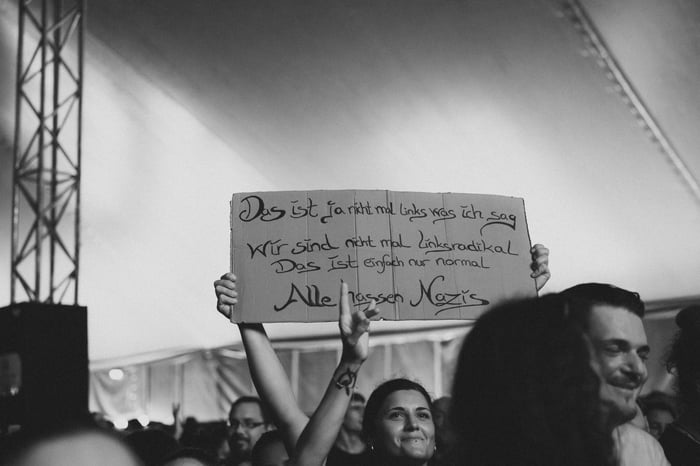
ALLE HASSEN NAZIS
Laura: You released the song “Alle hassen Nazis” (Everyone Hates Nazis) a few years ago, and it’s still your most well-known track today. Just the title alone sends a very clear message. How was the response back then?
Jonas: That song is from 2018, and ever since its release, it’s been our most popular song. We keep trying with each new release, but we can't top it. However, we definitely love the song, and the feedback has always been massive, overwhelmingly positive. That song means a lot to a lot of people, and to us, too. There was actually some feedback from within the left scene because in the chorus we say: „Das ist ja nichtmal links was ich sag, wir sind ja nichtmal linksradikal.“ (It isn’t even left-wing what I’m saying, we’re not even radically left). As of now, I’d absolutely say I am radically left. Because radical doesn’t mean what many think or how many have framed it. It doesn't mean that you're violent; it comes from the root, to challenge or fight something at its root - for example, our capitalist society. So yeah, I’d say I’m a radical left. I didn’t say that in the song, but the point was kind of to say, “Hey, it’s totally normal to say: Everyone hates Nazis." That’s probably why the song was so successful as well.
Laura: And how is the response now?
Jonas: Ironically and sadly, it gets rediscovered every year whenever some far-right bullshit gets exposed. Like that investigation by correctiv.org, where it was leaked that many successful businessmen, but also members from the AfD and even the CDU, which people often like to ignore, were planning awful deportation schemes in Germany. They were secretly bugged, and it got published. That led to massive protests, I think that was early 2024. After that, the song blew up again. People were commenting on the video, saying, “Yes! This song is so important, it was written for this exact moment!” And others were like, “This song is a few years old.” - It's six years old, and the others were like, “What? That can't be true.”
Laura: It’s quite crazy that the song is still so relevant and continuously rediscovered.
Jonas: Yeah, it still hits at the right places, which is wild. There were more protests earlier this year, and the song got another big push. People were like, “So cool this song exists.” Then they realize, “Wait, it’s six years old. That can’t be.” So yeah, it’s nice and makes us happy. Of course, it would be even better if the song wasn’t still necessary and this far-right pressure finally stopped. Currently, there’s also a live version of “Alle hassen Nazis”, because we've added a new part when we play it live now, where we say, „Dieses Land braucht mehr Linksradikale“ (This country needs more radical leftists). But the original version is more accessible, especially to people who don’t necessarily identify as left-wing. That’s why it’s still often played at demos.
Laura: You had a performance at a demo in Munich that had to be stopped because there were too many people. Can you tell us more about that?
Jonas: Yeah, sure. Just to clarify, not that many people came specifically for us. It was a massive protest in Munich, I can’t remember if it was 2023 or 2024. We were invited by Fridays for Future, who helped organize it. It was a demo against the far right. I think they were expecting 50.000 people, but in the backstage area, we kept hearing updates like “Oh wow, we’re at 100.000. Okay, now 150.000, whoa, 200.000.” We were supposed to be the last act that night, but for some reason, I can’t even remember why, we asked to go on first because we had to leave early or something. Luckily, we did, because we were the only band that got to play. We did two or three songs, then the organizer came on stage, pulled me aside, and said, “There are 250,000 people here. We have to stop. We can’t guarantee safety anymore.” I was like, “Please, can we just play one more song?” because we hadn’t played “Alle hassen Nazis” yet. I was like, “Come on, that’s why everyone’s here.” She agreed and announced that the event had to be stopped; people weren’t thrilled, but then she added, “But KAFVKA gets to play one more song.” And the crowd went wild. It was total hype, an incredible rush for us. We played the song and everyone went crazy.
Laura: Especially in front of such a massive demo crowd!
Jonas: Yeah! I mean, it’s not like Lady Gaga in Brazil, but 250,000 people is huge. It was a small stage, so not everyone could see us, and we couldn’t see them. That number still feels unreal to me. It was at the end of a long street, and the crowd stretched all the way back and into the side streets. They set up speakers down the street so people could at least hear us. So, it wasn’t a typical concert where everyone could see us since it was a small stage, but it was still the biggest audience we’ve ever had. A really special experience, and of course, amazing that so many people showed up to stand against the far-right.
Laura: Definitely. In a way, it’s even cool that they had to stop it because so many people came.
Jonas: Yeah, it definitely sent a strong message.
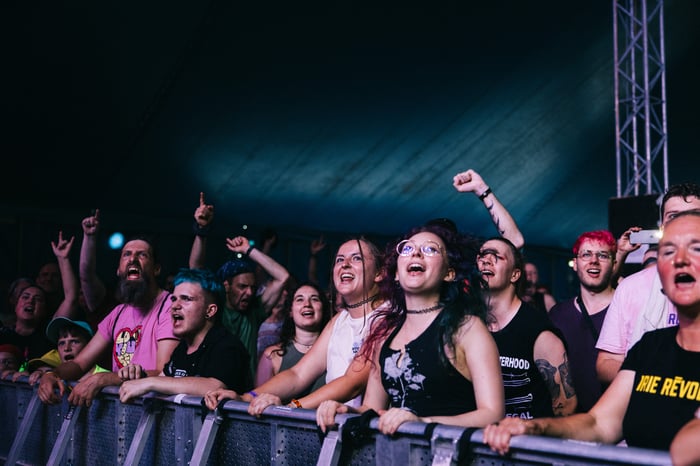
BETWEEN FESTIVALS AND CONCERTS
Laura: It’s festival season. That’s obviously different from a demo, but also big crowds. You’re playing a few festivals this summer. Do you prefer festivals or your own shows? Big stage or small stage?
Jonas: Festivals and our own shows really can’t be compared. I love both, we all love both. They each have a different kind of intensity. Big festivals like Hurricane or Southside – those are incredible. Everything is at such a high professional level. The sound, the stage, the tech – everything is perfect. Everything what those people do is amazing. And surprisingly, a lot of people showed up for our sets, like 10.000 or so, even though we were the openers. That gave us such a euphoric high. Festival crowds are hyped from the first second. You just say “hello” and they’re already like “YEAH, let’s party!” Even though we deal with heavy topics sometimes, we structure our set so there’s room to celebrate too. And people want to party, that’s why they’re at a festival. So they’re easier for us in a way. Of course, I’ve had different experiences too, depending on the festival. But overall, if there’s a good vibe and you have people there who are down for everything, nothing can go wrong and it’s just fun for everyone. For us, it’s also always important to raise awareness. So everybody is careful with each other and consent is always present. That’s what we always do, most of the people that come to our crowds are great!
Laura: And what about your own shows?
Jonas: With our own shows, it’s more like family. Sure, sometimes there’s someone behaving weirdly, but that’s rare. We often get feedback, especially from women and FLINTA people, that they felt safe at our shows, more than at other events. That means a lot to us. People know every lyric, they rap and sing along, and there’s this beautiful energy and connection. I think – and that’s also the feedback we receive – that all get so much strength for everyday life and the fight against far right and people fighting with discrimination. It reminds you that there are still so many good-hearted people out there. Just beautiful from the inside. That’s why I love both. *laughs*
Laura: That sounds really wonderful. And you’re going back on tour soon, starting September 2025 and continuing in March 2026. Is there a city you're especially excited to play for?
Jonas: Honestly, it’s all great. There are a few cities that hit even harder, but actually, it’s all equally nice. We’ve been going to the same cities for years now, so we see familiar faces plus new ones. That’s always great.
Laura: Was there a show that really stuck with you? Besides the Munich demo?
Jonas: Oh yes, definitely. Like a few weeks ago at Southside Festival – that was one of my top five concert experiences ever. But it was also because I wasn’t doing well beforehand. I hadn’t slept the night before. I was stressing out about how to use that big stage properly to get a political message across. I was totally spiraling and convinced the show would suck so I couldn’t get any sleep the night before. I was so exhausted the next morning that I cried at breakfast with the others. They were like, “Oh no, we play in five hours!” But on the way to the festival it hit me: I’ll just tell the crowd how I’m feeling, that’s okay. And once I made that decision and did it, all the anxiety disappeared. I felt free. And I think because the bad feelings were so strong beforehand, the high on stage was even more intense. Plus, it was our guitarist Alessio’s birthday, and he wore this nice white suit for the first time and after, we were on the festival grounds the whole time. We had such an amazing day. Our whole 2024 tour was also really great. The venues were a bit bigger, like 500/600/800 people. It’s been a slow, steady growth. Still intimate, great feedback. Really lovely overall.
Laura: Speaking from the perspective of a concert- and festival-goer. I think it’s always amazing when someone is just authentic and honest. Saying “I’m not okay” makes artists so much more relatable. It’s so important since people sometimes forget with – especially big – artists that they’re still human.
Jonas: Yeah exactly. People think everything’s always smooth, but it’s not.
Laura: Totally. It’s normal to be nervous. It’s a big festival and a big opportunity. I think it’s awesome that you were honest. I’m sure everyone appreciated it! So thank you for your honesty!
Jonas: I think so too. It was definitely the right choice, I just didn’t realize it at first. Took me a while to get there.
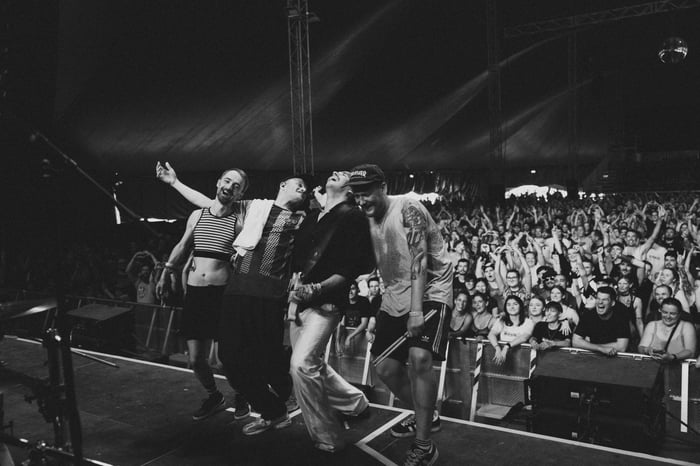
MUSIC INDUSTRY, POLITICS AND MESSAGES
Laura: You used to be signed to a label, but now you’re independent under your own label. Why did you make that shift? Was it about creative freedom, or because the music industry isn’t always cool with political artists?
Jonas: Actually, neither. We were never on a major label and I think that also makes a big difference. Majors probably try to interfere more. Our first album was with WolfPack, a small hip hop label from Berlin. That was really important for us, because they were the first people to say, “Hey, what you’re doing is cool, keep going.” At the time, we were just jamming in the rehearsal room. Getting to release something through them gave us confidence. We always had a very transparent relationship. But it became clear over time that they couldn’t really help us move forward as they’re rooted in the hip hop/rap scene and we’re not easily categorized in that sense. They gave their all for our first EP and album, but it made sense for both sides not to keep going.
Then we searched for another label. We had a manager back then who tried to find us one, but no one was interested. We were much smaller then, basically unknown. So no label wanted us. That manager – who was quite a bit older than us – had previously run a label with a friend or something like that. He reactivated it, and we released one or two albums there. But it an indie label so self-organized. By the time we made Paroli in 2021, we decided we’d rather release under our own label. We realized that the label we were on wasn’t really active and wasn’t doing any work to help us. We were already doing everything ourselves. So why give away money that wasn’t even covering costs at the time and we do everything ourselves anyway? Plus, our relationship with that manager was kind of pointing to going our separate ways. So we said, “Let’s just create our own label.” Now we release everything through it, which is also great for solo projects. Others in the band will also be putting out solo stuff soon. We can do all that through our label.
Laura: So the band and solo stuff is all under one roof?
Jonas: Exactly. The idea isn’t really to sign other artists. Maybe in 10 years, ask me then laughs. The label is called “ZUKUNFVT” (Future), so who knows, maybe we’ll use it differently in the future.
Laura: Do you have any advice for new bands making political music who are maybe afraid of backlash or don’t know how to start?
Jonas: I think regardless of politics, I’d tell all artists: Just keep going and don’t care whether anyone likes it or not. If it feels right or exciting to you, stick with it. That persistence often pays off. We played tons of shows – even in front of just two or three people – but always tried to deliver top-level performances.
For political acts specifically: “Make sure your address is not online.” That would be a nightmare for me. So far, the far right can only attack me online, and honestly, that doesn’t bother me or the band much. But I know it’s harder for bands not based in Berlin, Vienna, or Hamburg. If you’re in a more hostile area, where there are more right-wing people, that’s tougher. I don’t have good advice for that, since I’ve been lucky not to face that myself. If you can, maybe consider moving to one of those places.
Laura: Do you have a message for the younger generation, anything you’d like to share?
Jonas: Maybe it’s a bit cheesy and a cliché, but: I think all of us all left-leaning people and all people who care about humanity, need to stay connected and remind ourselves that our strength lies in our solidarity within each other. Especially with those who have fewer privileges. That’s something the no one can’t take from us. Something the far-right can’t take from us. We just have to stay strong!
Laura: Thank you so much for taking the time to talk with The Unseen Mag!
Jonas: Of course, happy to!
Laura: We have an Artist Recommendation Playlist. If you want, you can pick a couple of songs we can add.
Jonas: Totally, I’ll check my playlist. Pulls out his phone Do you know Grenzkontrolle? Their song Revolution is great, if it’s not already in there. Also OG LU, the song is called Eh Eh.
Laura: Thank you for your recommendations and thank you again for your time, Jonas! All the best to you and KAFVKA!
LISTEN TO KAVFKA'S FAVORITES HERE:
Disclaimer
If you or someone you know struggles with mental health, you are not alone! If you need support, please reach out to a mental health professional or contact one of the following organizations:
Australia: Lifeline Australia – 24/7 crisis support. Phone: 13 11 14. Website: lifeline.org.au
Europe: Find a Helpline (by Befrienders Worldwide) – Directory of crisis lines by country. Website: findahelpline.com
Germany: Hilfe-Info - multiple phone numbers and guide: https://www.hilfe-info.de/Webs/hilfeinfo/EN/HelpAndAdvice/Psychological_support/PsychologischeUnterstuetzung_node.html
United States: NAMI (National Alliance on Mental Illness) – Education, support, and advocacy. Phone: 1-800-950-NAMI (6264). Website: nami.org
or
988 Suicide & Crisis Lifeline. Phone: 988 (available 24/7)
INTERVIEW BY
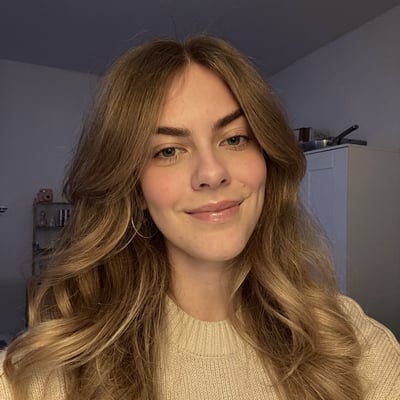
Laura
The excitement and emotions of loving something so deeply, let it be a musician, song, concert, books or even sports, has always been a prevalent and influencing part of my life. Time goes by so quickly, and I love to indulge in the sense of community being experienced in music, with book-lovers or sports fans. My favorite part is the very connection you share with people, strangers becoming friends and the joy of discovering something new that you learn to love. Sharing my passions, newest discoveries, new/old recommendations and so much more is what brings me joy in my spare time and is what I like to do as a writer for this magazine.
PHOTOS BY
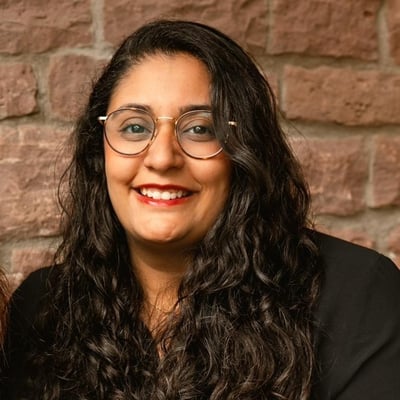
Fernanda
I found my creativity in photography. I love to reinvent myself through photography, especially while focusing on concerts and fashion.
